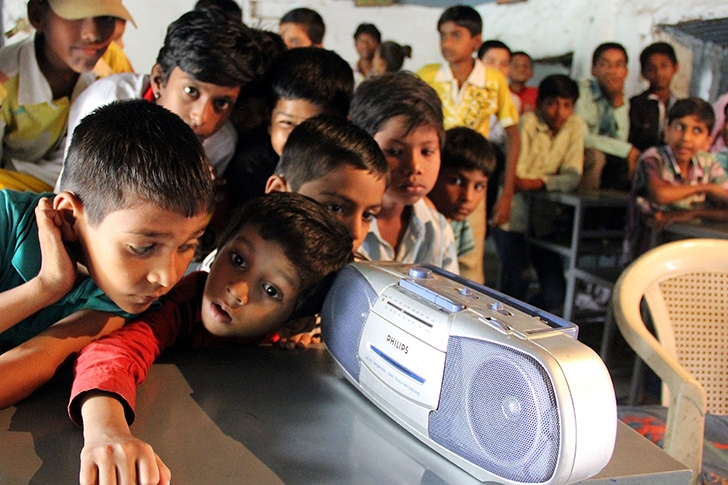The Indian Prime Minister has twigged something that President Trump has yet to understand. On Monday, celebrated as World Radio Day, Narendra Modi tweeted his congratulations to ‘all radio lovers and those who work for the radio industry and keep the medium active and vibrant’. Modi uses radio to reach out to those in his country who live in its most remote and inaccessible corners, giving a monthly address to the nation known as ‘Mann Ki Baat’ (or ‘To mind’). He says it’s his way of ‘sharing his thoughts’ with his citizens, and a useful way of extending the tentacles of government into those areas where television sets are uncommon, let alone computer screens or smartphones.
Modi has understood the power of radio to reach those parts that even Twitter can’t access, and the way that radio is in many ways more powerful than online communication — because of the way it gets inside your mind. As the World Radio Day website says, ‘It informs and transforms’, and best of all it allows for audience participation, not through an exchange of words written and read via a digitally manipulated screen but through the human voice, a tangible connection, person to person. If you have a radio, you need never feel alone — as so many hostages have testified after their release. What kept them entertained and informed, but most of all helped them not to lose their connection to the world and their own selves while in solitary confinement, was listening to voices on air, often via the BBC World Service.
On Wednesday, Hope Speaks Out on the World Service (produced by Mukti Jain Campion) told the story of a radio station run by refugees that is helping to connect those who have been forced to flee their homelands with those who have given them refuge. The Refugee Radio Network in Hamburg was founded by Larry Macaulay, himself a refugee from Nigeria. He fled the violence there in 2008 and settled in Libya, but had to drop everything and leave that country in 2011 as the civil war broke out. He crossed the Mediterranean to Italy in a fishing boat and spent two years in a camp before making it to Germany. He wants his network, which broadcasts online courtesy of a German community-radio station, to give a voice to those whose stories have not so far been heard. ‘No one asked me what was my experience in Afghanistan,’ said one refugee, from a rich family with a high-flying career. No one seemed to care what he had been before losing everything to events entirely beyond his control.
Macaulay wants his listeners ‘to understand who we are as human beings — not just headlines’. But the station also gives advice to the new settlers from Syria, Iraq, Somalia, Palestine and elsewhere about how to survive and make friends in Germany — don’t make a noise and party after 10 p.m. Be on time. Buy a ticket for the train.
In a programme called Common Voices, two young women, Reem and Frishteh, who have been forced to leave Saudi Arabia and Afghanistan by war and discrimination, host a discussion on topics aimed at giving women the courage to speak out. ‘I studied computer programming,’ said Reem. ‘Everyone told me it was not possible. I made it possible.’
Back in the 1960s the writer Peter O’Donnell challenged the idea that only a man could be as daring, dashing and debonair as James Bond by creating Modesty Blaise, the heroine of a comic strip first published in the London Evening Standard. Modesty is every bit as chic as Bond, drives a Jensen, listens to Thelonious Monk, wears a catsuit (of course) and is just as deft with guns and martial arts. She’s also so smart she can twist every man she meets around her finger. In this dramatisation by Stef Penney for Radio 4’s 15-minute drama slot, Modesty (played deliciously by Daphne Alexander) gets caught up in a plot to kidnap a British intelligence officer
while on holiday in the south of France (where else?).
‘I’m doing for blackmail what Ford did for automobiles,’ boasts the chief villain, Colonel Jim, in a terrible American accent. Modesty meanwhile revs up her Jensen as she rescues the chief witness to the kidnapping. ‘You’re a real cracker, Duckie!’ he exclaims. It’s all very silly but so refreshingly dated in a production (by Kate McAll) that’s every bit as slick and engaging as the Sunday-night drama on Radio 3, Jenny Lomas, by the award-winning writer David Eldridge (and produced by Sally Avens).
Jenny is a solicitor who specialises in family law and takes on the case of a young girl whose parents, a Polish ‘civil servant’ and his English-born wife, are fighting over who should have custody. It sounds simple enough until Jenny’s car is tampered with, her flat is burgled, her cat exterminated. She is frightened and then confused when no one, not even her boyfriend, believes her. ‘What’s real and what’s in someone’s head?’ she asks in a creepy, clever play that investigates the impact of the internet and our own willing submission to its dangers.






Comments